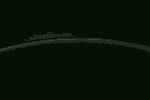Heh, my paper that we had to write, all in one night, this night, actually, is about The Return of the King. I know my fellow nerds here will back me up on how awesome that is. Here it is, if anyone cares:
Blake, the True Lord of the Rings To say the least,
The Lord of the Rings: the Return of the King is a long, involving affair with an even longer and involving title. But under the initial layer of glossy images of elven warriors prancing around a battlefield slaying all who oppose them, there is a deeper meaning to what the director, Peter Jackson, probably initially thought. But, there is no time to dilly-dally about what people think, unless, of course, they are involved in the task ahead.
The movie starts rather bitter-sweetly. With a victory at the battle of Helm’s Deep, the warriors that are still alive hold a feast in order to celebrate the sacrifices made by their lost brothers. They are currently in Eden. This could be attempted to be disproved, however, since they are still in a great struggle with evil, but is not the case. The celebration that takes place is an isolated island of joy amid an angry sea of hate, and for that short, precious amount of time, before that sea overcomes the tiny island, the characters can really have something to be happy about. Basically, the celebration is a welcome change to the fighting they have endured as of late. It is a removal from the current state of affairs, it is Eden in all of its glory.
Things quickly plunge down to Bula, though, when the focus switches from the aforementioned celebration to Frodo, Sam and Gollum, who are all in the wilderness. Bula is nature, and that is exactly the terrain the two are carefully picking their way through. The nature at this point is not evil, yet, and they are simply outside, experiencing the world through the eyes of mother nature.
Then comes Generation, which are simple humans. This occurs within the walls of Edoras, the capital of Rohan, when Pippen, acting as an curious human being, accidentally sees the plan of the enemy through a magic glass globe he innocently wished to get a closer look at. The descent into Ulro is instantanious. He sees fire, death, and a city being razed to the ground be the evil armies of the enemy. Ulro sticks, this time, for a good while.
The next scene is when a human city on the verge of being taken is attacked by hundreds of enemy Orcs. The battle rages on until the pitifully small number of humans realizes they cannot win. They retreat, and are plagued by enemy dragons until, like an angel symbolizing an ascent into Eden, Gandalf the wizard, in white robes, carrying a white staff, holds the monstars at bay with a brilliant beam of white light.
Eden does not last, however, as we immidiately go down to Generation, in two unique ways. First, Frodo starts to succumb to the power of the ring, and starts listening to Gollum, who tricks him into thinking Sam is an enemy out for the ring. Since this is not true, it shows how humanity is gullable, and easily tainted with pretty little trinkets. Second, the city that Gandalf is at, Minas Tirith, is about to come onder siege by a massive force of Orc warriors, and the city is in a state of panic, the true way regular people would respond in such a situation.
Then the hammer falls, as does the storyline into Ulro again. The Orc army attacks, devastating the helpless city and all of it’s inhabitants. Luckily, Eden is right around the corner, riding with ten thousand cavalrymen, and a legion of undead ghots warriors, whioch purge the city of every evil being possible.
But it is not over yet, as there is still much power in the land of the enemy, and the artifact that Frodo and Sam carry must be cast into the volcano there or else mankind has no hope. So, mustering the little energy then have left, they push towards the fires, only to be greeted by Gollum. After a fight sequence, the ring and Gollum are finally destroyed.
It all reverts back to Eden, and the adventure comes to a happy and touching end, with peace reigning, and the evil defeated. It is an ideal and fitting end for such a harrowing tale.
The Orc and Urizen cycle can be applied in a completely different manner, though. It starts with the birth and binding of Orc, the young activist. This is Frodo. He is the young one rebelling against the current ‘system’ in the lands of evil by setting out to destroy the ring. He is bound, though, by that which he chooses to destroy, the ring. It holds him back from doing the best he can possibly do.
Urizen, on the other hand, is Sauron, the dark lord himself. He explores his dens, in this case, options for conquest, rather early on. He send forces all at different points to see how to best assault the city of Minas Tirith. This, in the end, is thankfully not achieved, however.
Next is the crucifixion of Orc. This occurs at the climactic end of the movie, when Frodo is weakest, and most grievously wounded from his fight with Gollum. There is even an image to go along with this, as a gaint eage carries him off, he lay, with his arms out, almost as if he is on a cross.
Overall,
The Lord of the Rings: The Return of the King, is a more in-depth movie than most may think. Upon the simplist of examination, it reveals itself to be a true masterpiece, worth of Balke’s time honored system.
You might not get it, unless you know anything about William Blake.
This post has been edited by Sproogle: 17 December 2004 - 12:07 AM
 Sign In
Sign In Register
Register Help
Help




 MultiQuote
MultiQuote
















